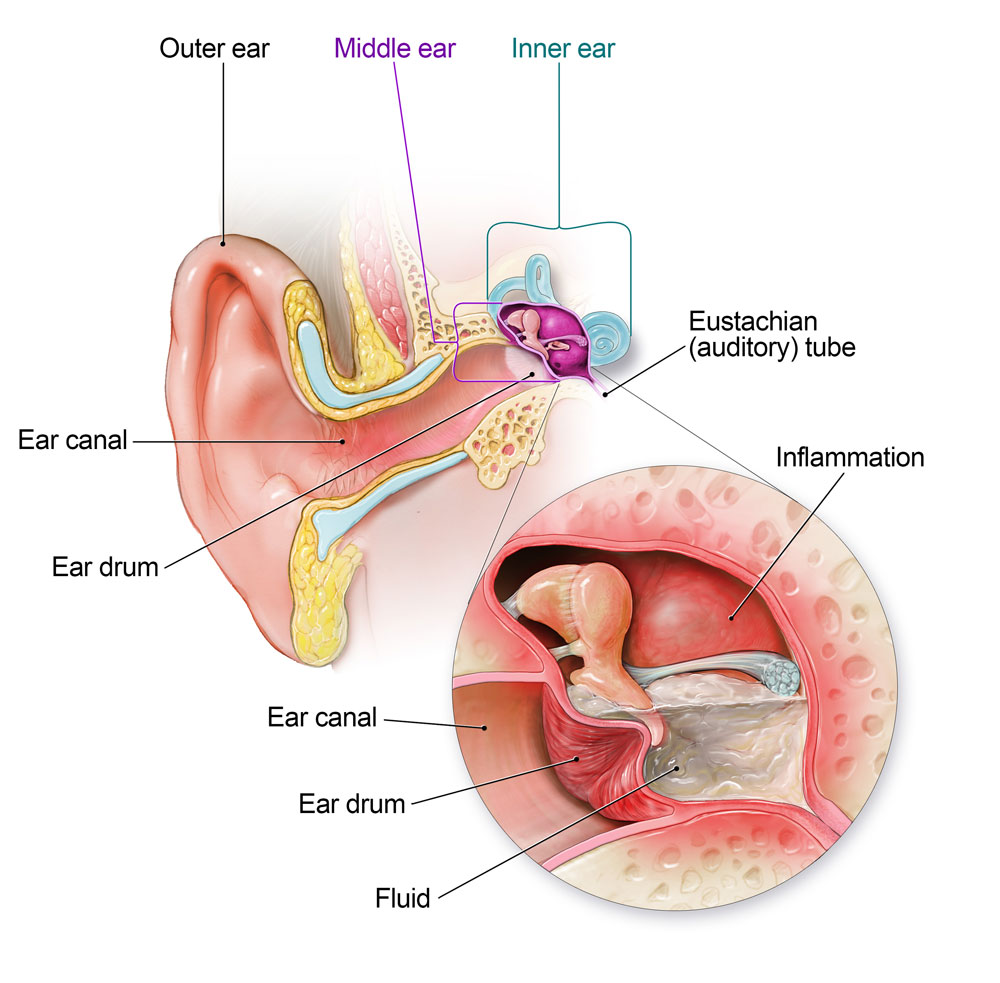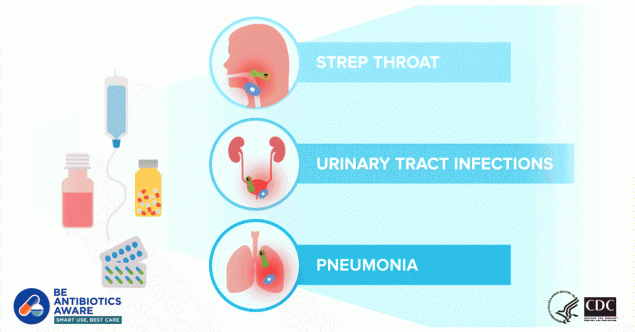Is your child’s ear hurting? It could be an ear infection. Children are more likely than adults to get ear infections. Talk to your child’s doctor about the best treatment.
Some ear infections, such as middle ear infections, need antibiotic treatment, but many can get better without antibiotics.
What is an ear infection?
There are different types of ear infections. Middle ear infection (acute otitis media) is an infection in the middle ear.
Another condition that affects the middle ear is called otitis media with effusion. This condition occurs when fluid builds up in the middle ear without causing an infection. Otitis media with effusion does not cause fever, ear pain, or pus build-up in the middle ear.
Swimmer’s ear is an infection in the outer ear canal. Swimmer’s Ear is different from a middle ear infection. For more information, visit “Swimmer’s Ear” (Otitis Externa).
Causes
Bacteria or viruses can cause a middle ear infection:
- Bacteria, like Streptococcus pneumoniae and Haemophilus influenzae (nontypeable) are the two most common bacteria causing middle ear infection
- Viruses, like those that cause colds can cause middle ear infection
Symptoms
Common symptoms of middle ear infection in children can include:
- Ear pain
- Fever
- Fussiness or irritability
- Rubbing or tugging at an ear
- Difficulty sleeping
When to Seek Medical Care
See a doctor if your child has:
- A fever of 102.2°F (39°C) or higher
- Pus, discharge, or fluid coming from the ear
- Worsening symptoms
- Symptoms of a middle ear infection that last for more than 2–3 days
- Hearing loss
This list is not all-inclusive. Please see a doctor for any symptom that is severe or concerning.
A healthy ear including outer, middle, and inner ear. An infected ear showing inflammation and fluid in the ear.
Talk to a healthcare professional right away if your child is under 3 months old with a fever of 100.4 °F (38 °C) or higher.
Treatment
A doctor can diagnose a middle ear infection by asking about symptoms and examining your child. The doctor will look inside your child’s ear to examine the eardrum and look for pus in the middle ear.
The body’s immune system can often fight off middle ear infection on its own. Antibiotics are sometimes not needed for middle ear infections. However, severe middle ear infections or infections that last longer than 2–3 days need antibiotics right away.
For mild middle ear infection, your doctor might recommend watchful waiting or delayed antibiotic prescribing.
- Watchful waiting: Your child’s doctor may suggest watching and waiting for 2-3 days to see if your child needs antibiotics. This gives the immune system time to fight off the infection. If your child’s symptoms don’t improve, the doctor may prescribe an antibiotic.
- Delayed prescribing: Your child’s doctor may prescribe an antibiotic but suggest that you wait 2–3 days before filling the prescription. Your child may recover on their own and may not need the antibiotic.
How to Feel Better
Below are some ways to feel better, even if antibiotics are needed for an ear infection:
- Rest.
- Extra water or other fluids.
- Over-the-Counter Medicines to relieve pain or fever.
Ask your doctor or pharmacist about over-the-counter medicines that can help you feel better. Always use over-the-counter medicines as directed.
Over-the-Counter Medicine and Children
Carefully read and follow instructions on over-the-counter medicine product labels before giving medicines to children. Some over-the-counter medicines are not recommended for children of certain ages.
- Pain relievers:
- Children younger than 6 months: only give acetaminophen.
- Children 6 months or older: it is OK to give acetaminophen or ibuprofen.
- Never give aspirin to children because it can cause Reye’s syndrome. Reye’s syndrome is a very serious, but rare illness that can harm the liver and brain.
- Cough and cold medicines:
- Children younger than 4 years old: do not use over-the-counter cough and cold medicines in young children unless a doctor specifically tells you to. Cough and cold medicines can result in serious and sometimes life-threatening side effects in young children.
- Children 4 years or older: discuss with your child’s doctor if over-the-counter cough and cold medicines are safe to give to your child.
Ask your doctor or pharmacist about the right dosage of over-the-counter medicines for your child’s age and size. Also, tell your child’s doctor and pharmacist about all prescription and over-the-counter medicines they are taking.
Prevention
You can help prevent ear infections by doing your best to stay healthy and keep others healthy, including:
- Receive recommended vaccines, such as flu vaccine and pneumococcal vaccine. Pneumococcal vaccine protects against a common cause of middle ear infections, Streptococcus pneumonia.
- Clean your hands.
- Breastfeed exclusively until your baby is 6 months old and continue to breastfeed for at least 12 months.
- Don’t smoke and avoid exposure to secondhand smoke.
- Dry your ears thoroughly after swimming.



